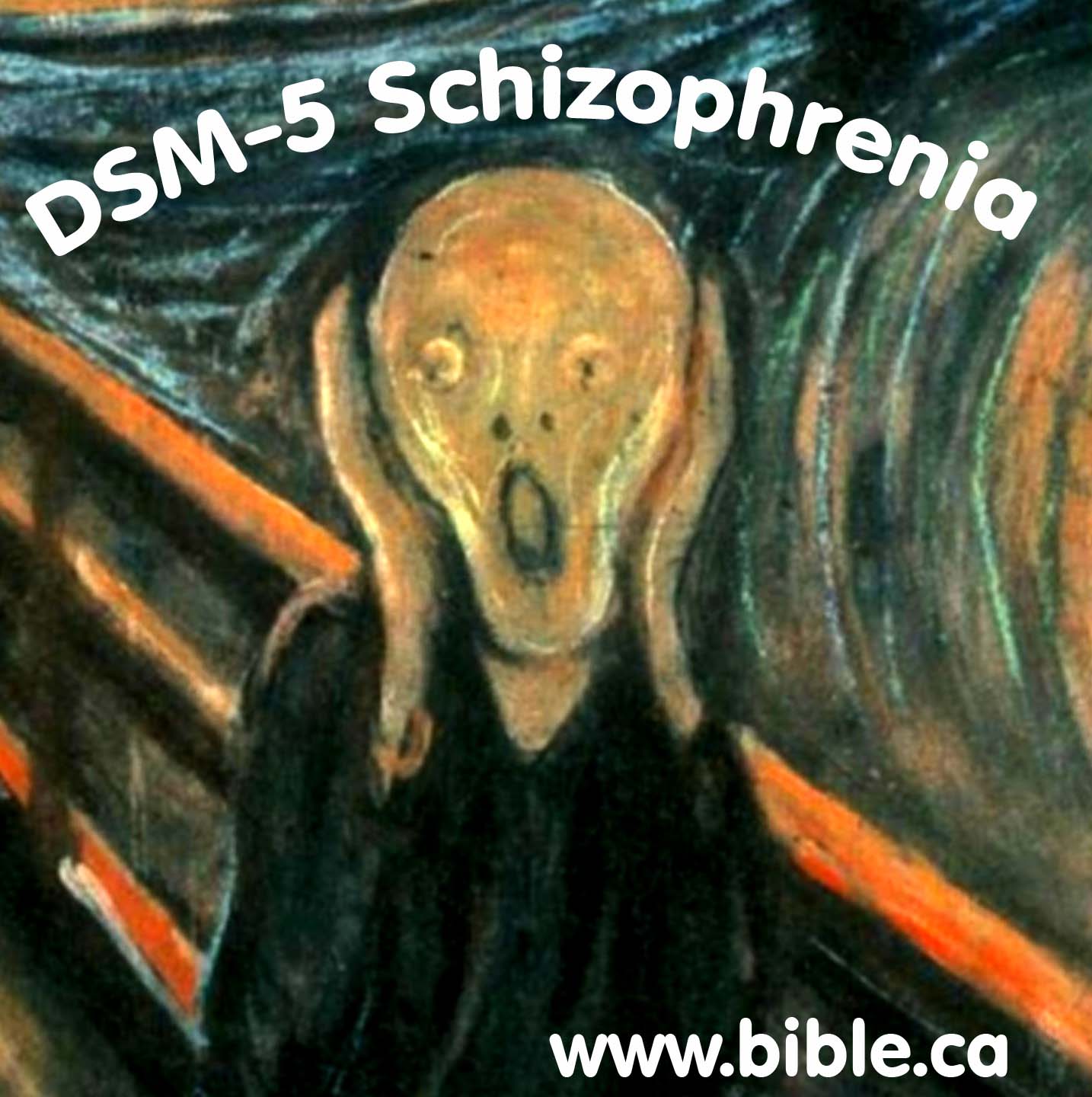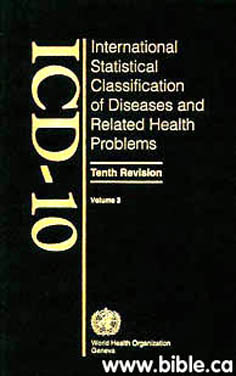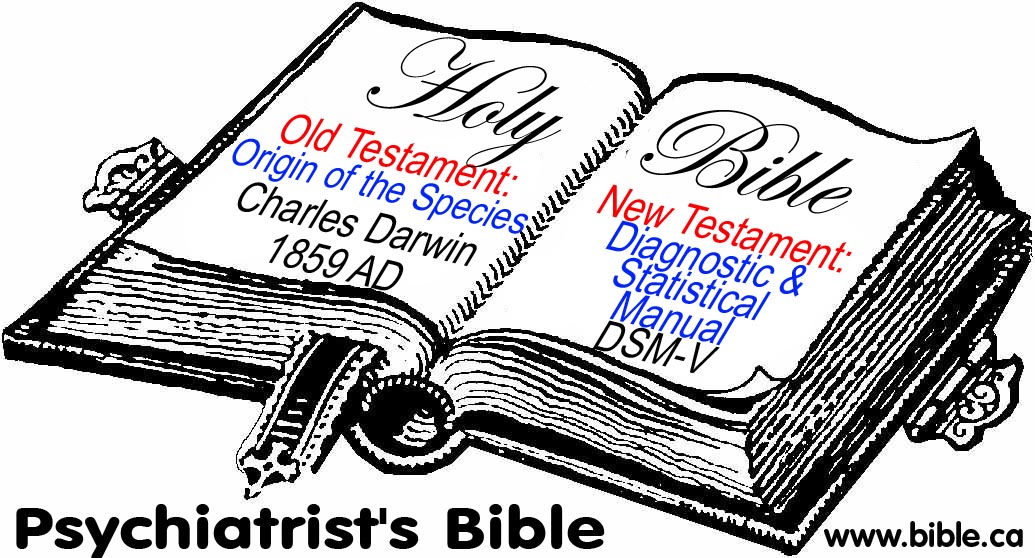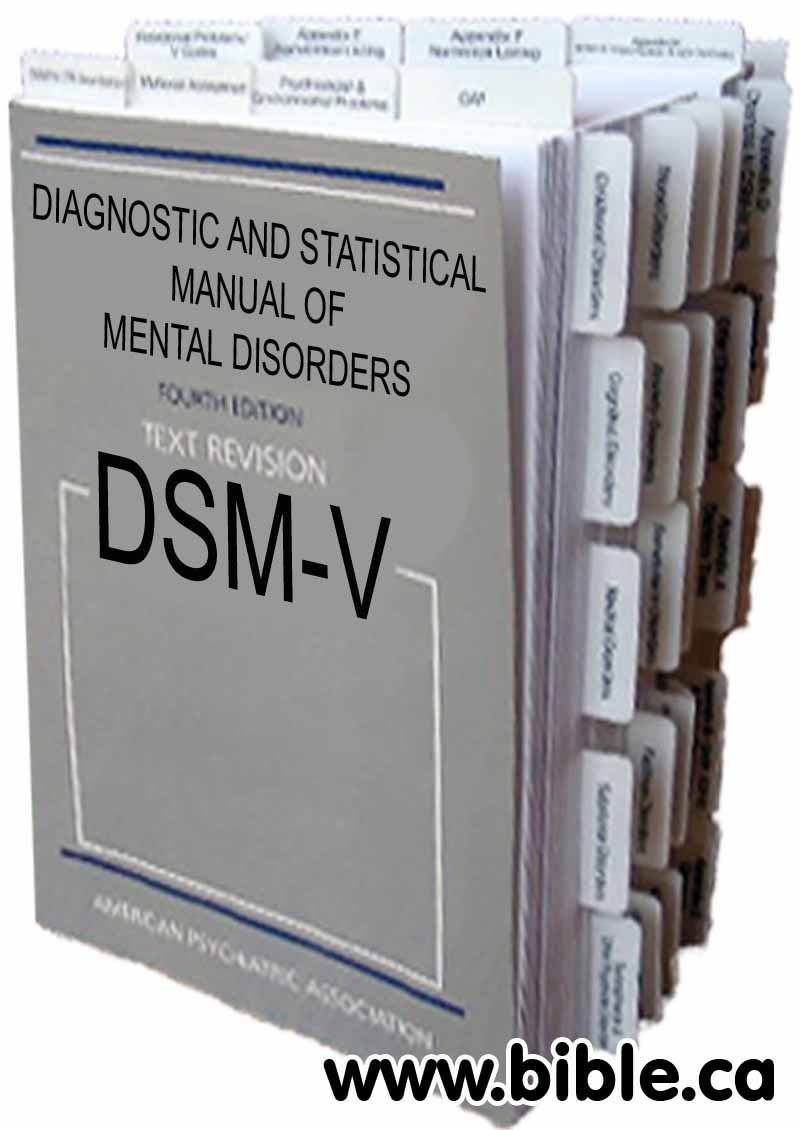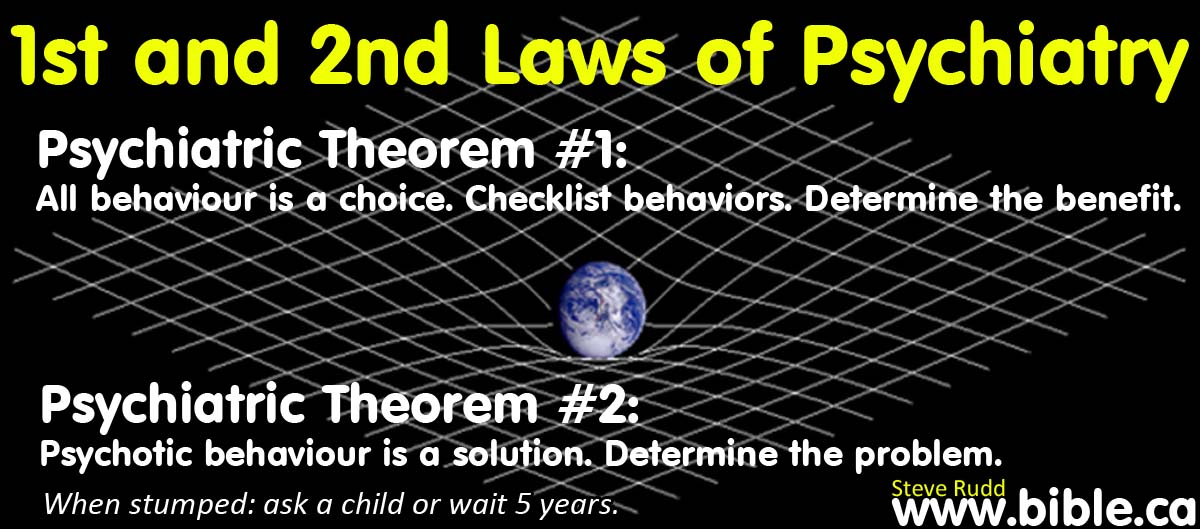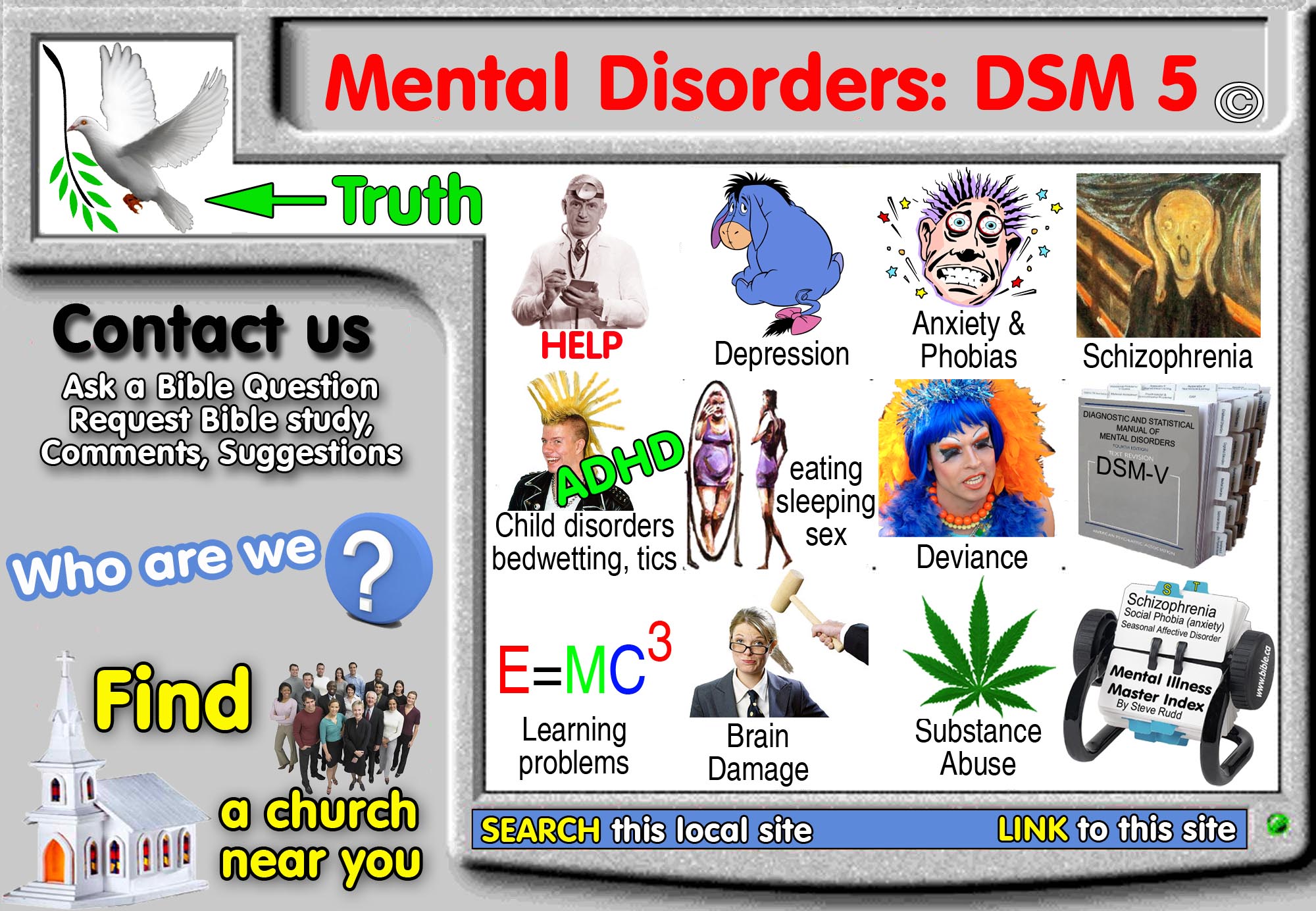DSM-IV, DSM-5, ICD-10: Schizophrenia and Delusion
Schizophrenia is how the mind rationalizes the irrational. Psychotic behaviour is a solution. Determine the problem.
|
|
|||
|
|
Schizophrenia and Delusion F20-F29 Schizophrenia, schizotypal and delusional, and other non-mood psychotic disorders Schizophrenia is a solution to personal problems. |
||
|
|
|||
|
DSM-IV, DSM-5, ICD-10 International Classifications of Diseases Diagnostic and Statistical Manual |
|||
Introduction:
1. See main Schizophrenia page.
2. Schizophrenia is a behaviour choice, not a disease or medical condition.
A. What is Schizophrenia?
1. Schizophrenia, insanity, madness are synonymous terms that describe an individual who has chosen to allow themselves to form the habit of engaging in sinful behaviours that annoy, bother, offend, threaten others and create their own false reality of self-delusion for the purpose of escaping some personal life problem which they achieve through the control of others for personal gain through lies, manipulation, and sympathy through outward displays of self-created suffering, hardship and victimhood.
2. Historically, Schizophrenia is known as "dementia praecox", insanity or madness and is always associated with delusion and paranoia.
a. "When, in 1911, Bleuler renamed dementia praecox "schizophrenia," he identified the disease not by its characteristic histopathology, as was customary with diseases of the nervous system, but by its incurability!" That this is an utterly destructive way of describing a disease—a disease that, moreover, has no objective bodily manifestations and has never been known to be fatal —should be obvious." (The Myth Of Psychotherapy, Thomas Szasz, 1979 AD, p 165)
b. Saying someone is "Mad" has its origin in the root word for "out of control anger": madness. When people would launch into out of control acts of violence, they were said to be mad. Literally. That’s where the idea of Madness came from!
3. First and second Laws of Psychiatry:
a. Psychiatric theorem #1: Behaviour is a choice. Checklist behaviors. Determine the benefit.
b. Psychiatric theorem #2: Psychotic behaviour is a solution. Determine the problem.
4. Schizophrenia is the solution of how the mind rationalizes the irrational. Schizophrenia is a behaviour choice that creates an escape from reality in order to achieve a goal or gain a personal benefit. Schizophrenia can be a behaviour choice to escape unpleasant persecution or isolation at the hands of others. Schizophrenia can be a behaviour choice to escape the unpleasant life situation they have created for themselves. Schizophrenia is always an escape when all other rational doors are closed.
B. Schizophrenia Cases:
Conclusion:
1. Schizophrenia is a behaviour choice not a disease, genetic defect or caused by a chemical imbalance in the brain.
2. If schizophrenia were a disease, there would be at least one medical test, like a blood test, but there are none.
3. To underscore schizophrenia is not a disease medicine can detect, it is impossible to diagnose someone for schizophrenia unless they talk. If the person stays silent, there is no way medicine can diagnose him as a schizophrenic. Schizophrenia is behaviour not disease.
4. All psychotic behaviour is a solution to a problem a person is experiencing. They have a problem which behaviours like delusion and paranoia solve. All behaviour is a freewill choice. When someone is diagnosed with a mental illness, ignore the Biopsychiatric label of the DSM-5 and checklist the behaviours. Then with wisdom, determine what personal benefit they are deriving from engaging in those behaviours. Take a look a one of the over 20 cases we have presented.
5. Schizophrenia, insanity, madness are synonymous terms that describe an individual who has chosen to allow themselves to form the habit of engaging in sinful behaviours that annoy, bother, offend, threaten others and create their own false reality of self-delusion for the purpose of escaping some personal life problem which they achieve through the control of others for personal gain through lies, manipulation, and sympathy through outward displays of self-created suffering, hardship and victimhood.
6. See: main Schizophrenia page for detailed and in depth discussion.
|
DSM-IV, DSM-5, ICD-10: Schizophrenia and Delusion |
F20-F29 Schizophrenia, schizotypal and delusional, and other non-mood psychotic disorders
F20 Schizophrenia
F20.0 Paranoid schizophrenia
F20.1 Hebephrenic schizophrenia
F20.2 Catatonic schizophrenia
F20.3 Undifferentiated schizophrenia
F20.4 Postschizophrenic depression
F20.5 Residual schizophrenia
F20.6 Simple schizophrenia
F20.8 Other schizophrenia
F20.9 Schizophrenia, unspecified
F21 Schizotypal disorder
F22 Persistent delusional disorders
F22.0 Delusional disorder
F22.8 Other persistent delusional disorders
F22.9 Persistent delusional disorder, unspecified
F23 Acute and transient psychotic disorders
F23.0 Acute polymorphic psychotic disorder without symptoms of schizophrenia
F23.1 Acute polymorphic psychotic disorder with symptoms of schizophrenia
F23.2 Acute schizophrenia-like psychotic disorder
F23.3 Other acute predominantly delusional psychotic disorders
F23.8 Other acute and transient psychotic disorders
F23.9 Acute and transient psychotic disorder, unspecified
F24 Induced delusional disorder
F25 Schizoaffective disorders
F25.0 Schizoaffective disorder, manic type
F25.1 Schizoaffective disorder, depressive type
F25.2 Schizoaffective disorder, mixed type
F25.8 Other schizoaffective disorders
F25.9 Schizoaffective disorder, unspecified
F28 Other nonorganic psychotic disorders
F29 Unspecified nonorganic psychosis
By Steve Rudd: Contact the author for comments, input or corrections.
Send us your story about your experience with modern Psychiatry
